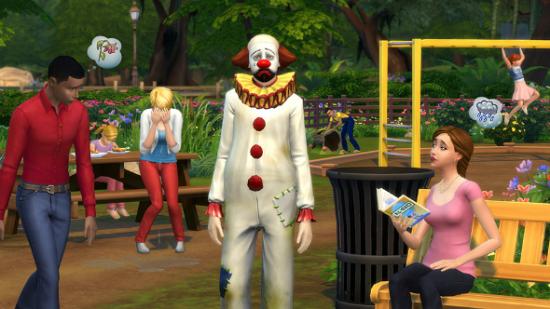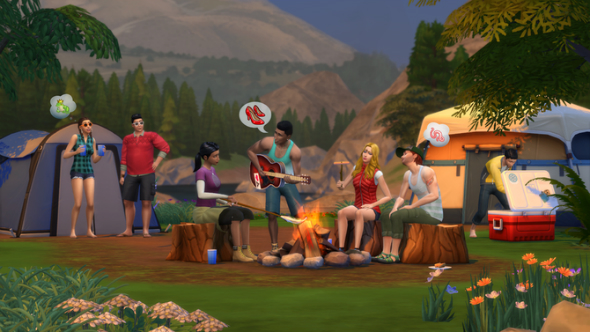The first Sims game, without doubt, is one of the most influential and widely enjoyed PC titles of all time. Close your eyes and you can still hear the soft jazz soundtrack. Keep them closed and you might even be able to remember the layout of your house. You know the one: you and your best buddies cohabiting under the collective surname ‘Roomie’, living off pizza, throwing pool parties, and working diligently towards moving into the mansion at the top of the street map.
Me? I don’t even have to close my eyes to remember it. My friends and I used to draw out the blueprints of our houses during English class and discuss our plans for upcoming renovations and extensions. I’ve still got the exercise books somewhere. In the garage, I think.
Aww, have you seen all the good boys and adorable kitties in The Sims 4: Cats and Dogs?
That’s not even the weird part. The weird part is that I feel a pang of shame admitting that. A shame I would not feel if I were to broadcast the fact that I once printed out a picture of Gordon Freeman and stuck it on my bedroom door for a while – the polygonal guardian of my boy-cave. Obviously, I don’t lead with that when I meet new people, but it doesn’t hold the same embarrassment as admitting I was once superinto the Sims. I don’t think I’m alone in that. There’s… somethingabout the Sims that means we don’t talk about it in the game industry as much as a game this size would normally warrant.
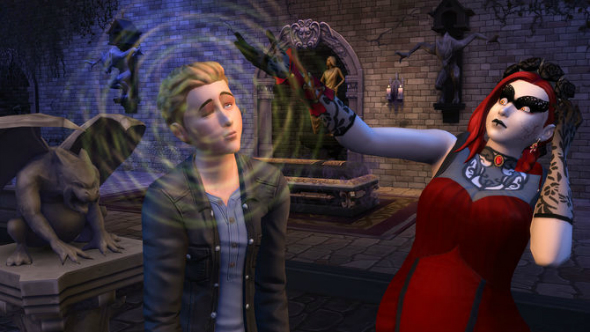
The series has sold over 175 million copies to date, after all, so it is not like The Sims doesn’t have an audience already. Perhaps what excludes latter day incarnation The Sims 4 and its entourage of post-release content from grabbing the column inches in 2018 is the perception that it’s a flimsy vessel with which to sell DLC to kids. We are talking about a series that literally got a piece of paid content called ‘Laundry Day Stuff’ recently, so I can understand that perception.
Or perhaps it’s that the whole idea of a doll’s house simulator simply isn’t for ‘gamers’, but exists for a different audience – either younger or way less hardcore than the sort of person who whiles away their evenings laying very still near a rock in PUBG. I can understand that one, too. Maybe it’s a gender issue: do we see The Sims as being ‘for girls’? I certainly remember the first Sims as being one of the first games that I heard female friends effusing about as well as male. Does the male-dominated games media thus overlook its ongoing releases?
With these thoughts tumbling through my mind like items of gender-neutral laundry in the washer, I decided to investigate The Sims 4 through direct contact with it and the many tendrils of its Expansion Packs, Game Packs, Stuff Packs, and user-created mods. Would I find a game in there that anyone could enjoy? Would I find a game at all? Or has The Sims become something else since its captivating 2000 debut? The only way to find out was to spend quite a lot of time and money on Maxis products.
Sim elation
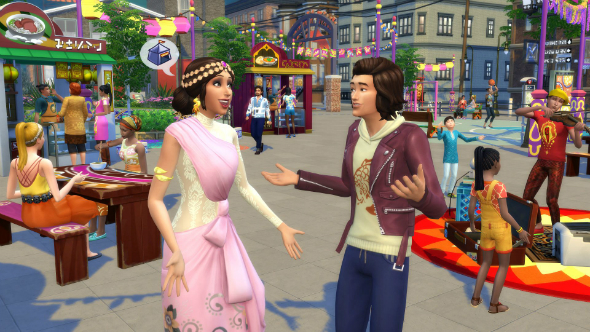
I report back having spent over 40 hours trying to make sense of it all. I haven’t played all the additional content because I’m not Elon Musk, but I’ve played enough of it to know that this is the most incredibly – and bizarrely – detailed simulator of life that has ever appeared on PC. In a very real and tangible way, The Sims 4 deserves credit.
Central to the series’ success, I think, is that trick it pulls in imitating life to a degree that ought not to be possible. You place little versions of people you know in a house, watch them interact, and go, ‘How does it knowBarbara always rattles on about her favourite writers?’. And, ‘Look, Sally’s going to bed at 4PM! Classic Sally’. Without the help of any additional content, The Sims 4 is brilliant at this. Using just a few character traits and the addition of context-dependent moods, it makes Sims appear unnervingly human, prone to depressive afternoons following an argument and fits of playfulness when life’s going their way. And since you, as the player, are given dominion over their entire life, a whole neighborhood’s life – there’s a magnetic draw to that which transcends preconceptions about this being a game for tweens.
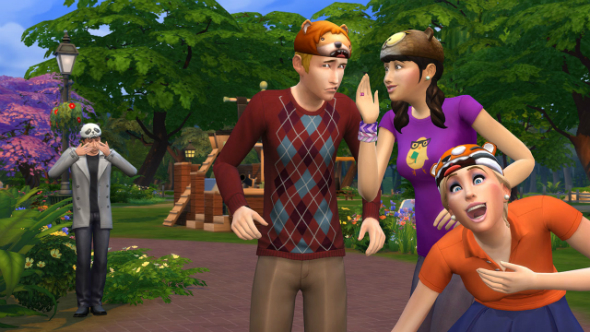
Additional content works like a level of detail slider, really. Expansion Packs offer a new way to play the game, like going with your Sim to their place of work, or taking them on vacation (while also adding a few new hairstyles, outfits, furniture items, and the like), and thus offer the clearest benefit to shelling out for them. I had a great time working as a doctor, diagnosing my neighbours with Bloaty Head and the like. The Get To Work expansion – of whose nomenclature Norman Tebbit would surely approve – feels essential to the experience once you have spent some time with it.
Game Packs aren’t quite as transformative. They offer new (non-playable) careers, neighbourhoods and fresh game elements like vampirism and going to a spa for a pamper. To be frank, I’d expected that any additional content below the Expansion Pack tier would feel like a stinging, blatant rip-off, but I didn’t feel that about Outdoor Retreat or Vampires when I played them. You don’t have to seek out the new content for it to seep into the virtual lives under your charge – an old, pale man might simply turn up at the door one night, insistent at being invited through the threshold before he enters. A new acquaintance at the bar downtown might start talking about bakery. Someone will walk past with a new haircut. Small touches, really, but they all work together in selling the illusion that this isa real, breathing ecosystem you are watching interact with itself.
Stuff and bother
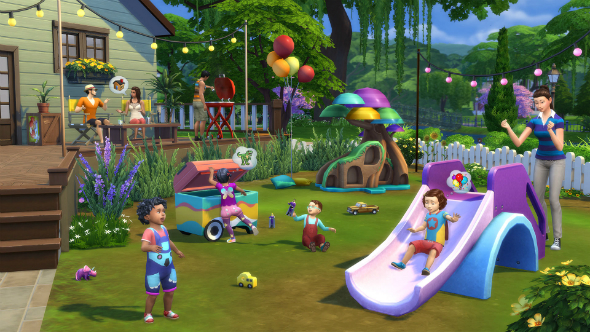
That leads us onto Stuff Packs. Now, Stuff Packs are why Sims DLC has a bad name. They’re priced lower than the other content packs, but since those are themselves overpriced – Expansions at £34.99 and Stuff Packs at £17.99 each – that’s not much consolation. The reality of paying £9.99 for a hot tub, which The Sims 1 managed to include in its base game back in 2000, a barbeque (likewise), and a few new outfits and furniture items is a harsh one that reveals the predatory side of EA’s business model for The Sims. The industry used to snort and scoff at The Sims 2 expansion packs over a decade ago, but at least they offered something beyond bits and bobs that had been included in previous base games.
There is absolutely no argument to be made for all of the additional content being worth the outlay, since the total now runs in excess of £400. There’s a slightly more cogent argument to be made for that smorgasbord of optional bits being made available so that people can pick and choose the extras they like, in turn paying whatever they can afford or feel comfortable with. But by any reasonable assessment, £9.99 is fundamentally too much money for what’s on offer in each Stuff Pack.
Another way of looking at The Sims 4, its perplexing cornucopia of post-release bits and bobs, and its unique play style, is that it’s an MMO. A single-player MMO in which the O stands for offline, hosting all manner of social interactions and virtual lives without requiring any other humans to power it. Where else might you spend hours on a skill that lets you play piano in the bars downtown for tips, thereby earning a living? Where else might you be able to run a shop that sells items you crafted yourself, again after grinding away at a skill? Where else is social status, and interaction, placed at the absolute epicentre of the experience?
That’s it, then. The Sims 4 is an MMO. One with a substantial but infrequent subscription model. One where the other denizens are as much under your control as your own avatar. And, like any self-respecting MMO, one where you can install mods that add genitals of all sorts of frightening sizes and levels of detail.
Sex appeal
Sex modding is the aspect of The Sims 4 that’s seen it most likely to poke its head above water in the games press since release. Look what these naughty modders have made the little computer people do! And look at all the different ways they do it! It’s only human nature, really: sex and death are the only things we’re truly interested in as a species, and in the absence of a combat mechanic we’re left with only one option in The Sims 4.
Related: Check out the best sex mods in the Sims 4
Wicked Whims (link NSFW) created by modder Turbodriver adds a completely new layer to The The Sims 4, all of it concerned with Sim sex. Sim sex on the toilet. Sim sex in a bush. Sim sex against a kitchen counter. Sim sex just straight up on the floor. All of it is animated by amateur enthusiasts and accompanied by hilariously repurposed audio from the game’s existing voice library. If The Sims really is a doll’s house simulator, Wicked Whims is the thing that lets you bump Barbie and Ken’s uglies together.
I’ll level with you now and say I didn’t research mods beyond the existence of Wicked Whims, because frankly I’m terrified of how deep and dark the rabbit hole gets. The existence of this mod – and who knows what else, frankly – does demonstrate that some portion of the game’s community is a) super-engaged with the game, and b) not content to play in the manner EA envisioned, as a family-friendly depiction of affluent American life.
Gender unbias
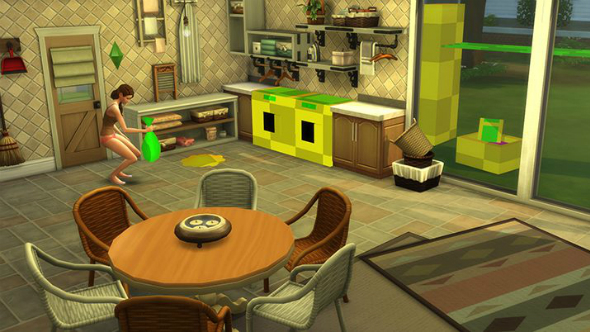
The vast majority of The Sims 4’s mods, though, are thoroughly SFW. Trawl through The Sims Resource (the very same site I used to visit on a 56k dial-up connection to browse The Sims 1 mods) and you’ll find thousands of hairstyles, clothes, houses, pre-made Sims, and makeup. It’s mostly makeup, to be honest. Makeup and girls’ outfits involving ripped jeans. The vast majority on the site seems to concern female Sims, which, at the risk of drawing a lazy conclusion, might well suggest that there are girls and women playing it in large numbers. Not just playing it, but creating new content for the community. It’s certainly not unique in that respect – plenty of games have significant numbers of female players – but it’s unusual in that so much of the developer-made and mod content is tailored for female characters.
Still more unusual is that The Sims 4’s character creation mode, Create-a-Sim, includes a full suite of gender options beyond the binary, cisgender, heterosexual male and female. The only other game I can think of that does anything like this is South Park: The Fractured But Whole, and really it’s only there to set up a gag. Here, it’s the foundation of a complete identity, offered without judgment.
Taking in all these facets of The Sims 4, it’s hard to shake the sense that its lack of visibility comes just as much from a difficulty in pinpointing its genre and audience as it is from token DLC packs with inflated price tags. But it’s not like there’s nothing to talk about in there. I have played 40 hours of the latest one and I’m still not sure what it is, besides an offline MMO. There’s a big and engaged modding community pulling it in wildly different directions four years after its release. As a series it has sold 175 million copies.
More (sort of) like this: The best sex games on PC
And I’ve covered it precisely twice in ten years of games writing. Why don’t we talk about The Sims more?
